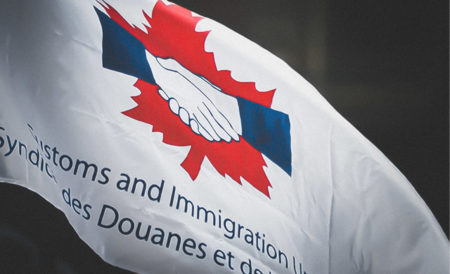CIU National President Mark Weber sent the following letter to the Hon. Marco Mendicino, Minister of Public Safety, on May 5, 2023.
Dear Minister,
In May of 2021, the Canada Border Services Agency (CBSA) and the Customs and Immigration Union (CIU), along with your predecessor, the Hon. Bill Blair, published a joint statement reiterating their commitment to eliminating systemic racism within the Agency. This statement made it clear that both CBSA and CIU agreed upon the necessity of working jointly to address systemic issues using a range of initiatives and resources, including anti‑racism training developed for all CBSA employees:
[…] the Minister of Public Safety, the President of the CBSA and the CIU agreed that anti‑racism training should be developed for all CBSA employees. The CIU National Executive identified a group of dedicated members who will work with the CBSA HR team and Anti-Racism Task Force to develop that training as well as de‑escalation training for frontline officers. These efforts are aimed at fostering positive and respectful interaction amongst CBSA employees and with the diverse clientele they serve at facilities and ports of entry across the country.
The initial agreement between then CIU National President Jean-Pierre Fortin and former Public Safety Minister Bill Blair was that the training would be developed by a joint CBSA-CIU working group and given by employees from the Agency — most of whom are racialized workers, and all of whom are well-acquainted with the realities of systemic racism both within and outside CBSA. The training was also supposed to be delivered in person for most workplaces.
However, due to the COVID restrictions in place at the time of launch, the training could not be offered in person, only virtually. Given the seriousness of the subject matter, this was far from optimal, as an in-person setting fosters engagement between facilitators and participants, allowing for more fruitful sessions. CBSA personnel taking the training may be confronted with concepts or personal experiences that are more difficult or uncomfortable to process at times. Discussing systemic racism, and how to address it, is not meant to be easy; in fact, it is through these challenging moments that progress and growth often occur.
An all-virtual setting is not nearly as effective in that respect, as it makes it easier for participants to disengage and avoid fully committing to the process — by, for example, turning off their camera. Obviously, given the health and safety considerations associated with COVID, our members who provided the training made do with the limitations of virtual platforms, with the understanding that they would switch to in-person once that would be feasible.
In a frustrating turn of events, since the end of COVID restrictions, CBSA has been pushing to continue delivering the training exclusively in a virtual setting, disregarding the expertise of those who were involved in developing the program. While it is understandable that in-person training may not be a possibility for all work sites, it makes no sense whatsoever to hold virtual sessions for employees in many CBSA workplaces, as they are already present on location.
Further compounding the issue, at the end of March of this year, CBSA indicated that it was pausing the training indefinitely. While no firm resumption date has been mentioned, there have been talks of bringing in external consultants to run the training should it resume, despite the Agency already having employees trained to do so — workers who, once again, understand the subject matter as it relates to the Agency better than anyone else. Since then, no training sessions have taken place, raising questions about CBSA’s commitment to the project.
Perhaps most galling about the decision to suspend the training as it exists is that the Agency claims it was done for the well-being of the facilitators, when at no point has CBSA consulted with them to ensure this was the desired course of action, or even necessary. Indeed, the facilitators who have delivered the course since its inception believe in the program they helped initiate and have no desire to see it paused.
The reality is that, over the past year-and-a-half, in stark contrast with earlier in the process, CBSA management involved in the training has become increasingly difficult to deal with, clearly attempting to sideline and ignore union representatives involved in the program. This same management also appears to have a poor understanding of the training itself and of what it seeks to accomplish, often demonstrating the same problematic attitudes the training is designed to address and failing to support the facilitators in the face of racist behaviour.
At the end of the day, it would simply seem that CBSA no longer sees CIU as an equal partner in rooting out systemic racism within the Agency, despite the heavy lifting done by CIU representatives in establishing the training in the first place.
Moving forward, if the Agency is serious in its commitment to working with the union in addressing systemic racism in CBSA workplaces, CIU proposes the following measures to help correct the situation:
- Training must resume immediately and, where possible, be delivered in person.
- Training must be delivered by the same intra-Agency facilitators who were instrumental in initiating the training, and those who have since been selected to provide the training.
- Managers overseeing the training program must take the training themselves and demonstrate a commitment to implementing its recommendations. Involving managers who are part of racialized groups in the training program may help in this respect.
- Upper CBSA management, including the CBSA President, along with national union representatives, should participate in a joint training session, as a sign of commitment to the initiative.
Your government has positioned itself as being keenly aware of the importance of anti-racist initiatives, and I am certain you’ll agree that continued cooperation between the union and the Agency can only result in a more effective outcome when addressing systemic issues and barriers. It makes little sense for CBSA to brush aside the expertise of its own personnel, or to insist that such crucial training should not be delivered in the most optimal way. Evidently, the issues I’ve highlighted must be addressed in a timely manner, and I look forward to working with you to remediate the situation.
Yours truly,
Mark Weber
National President
Click here for the PDF version.




